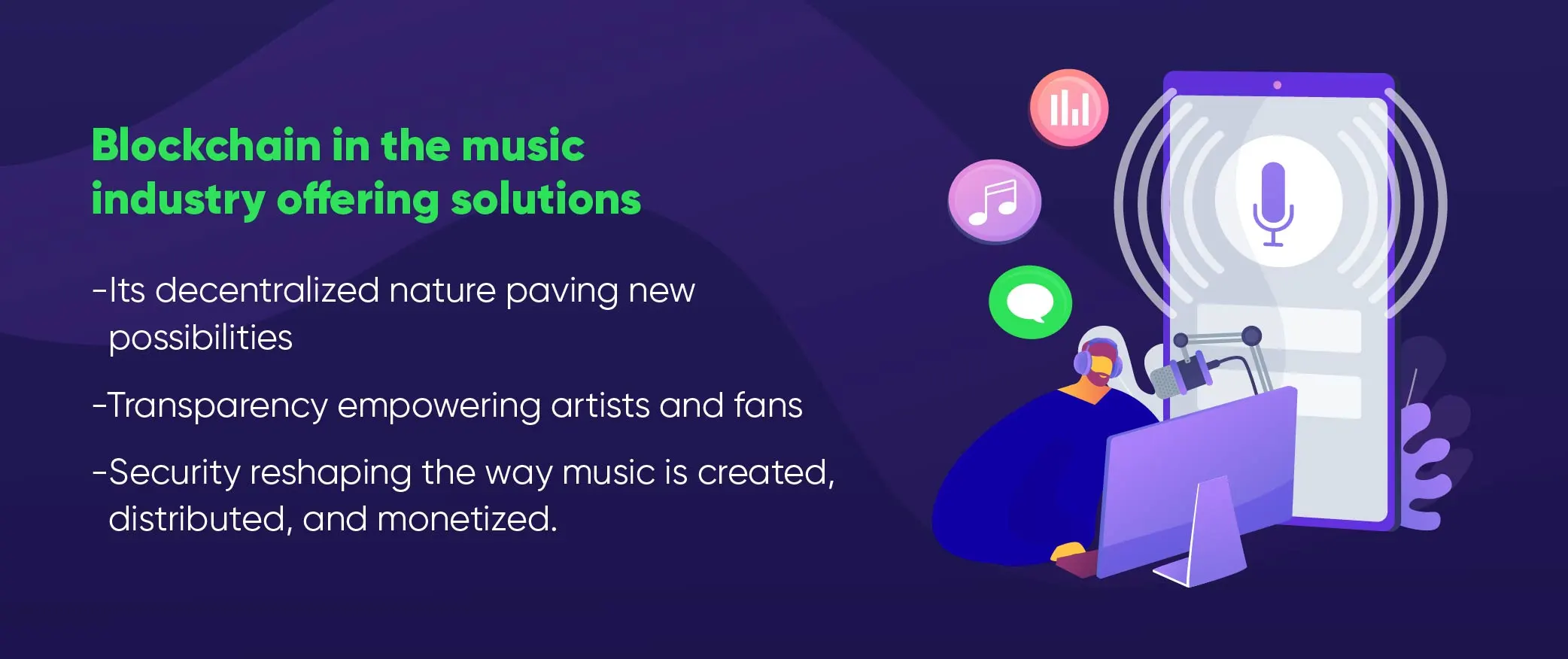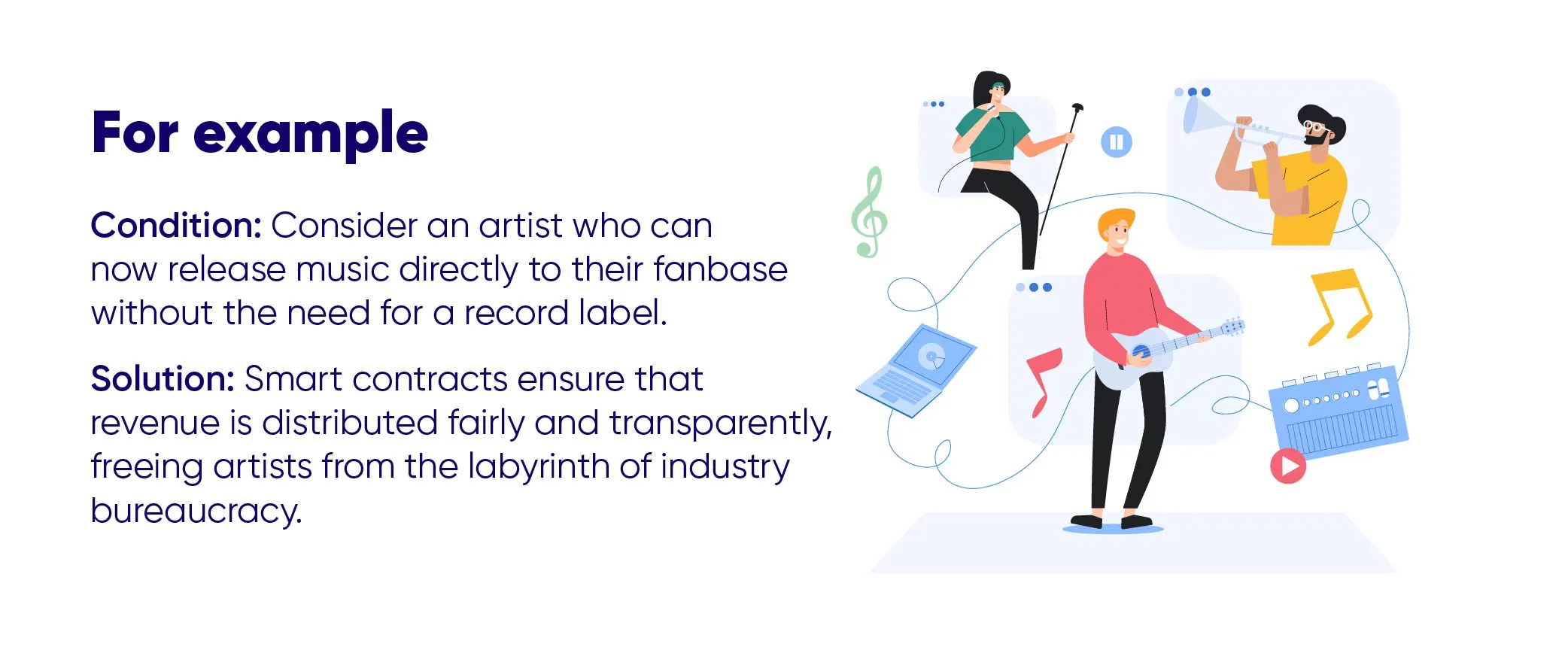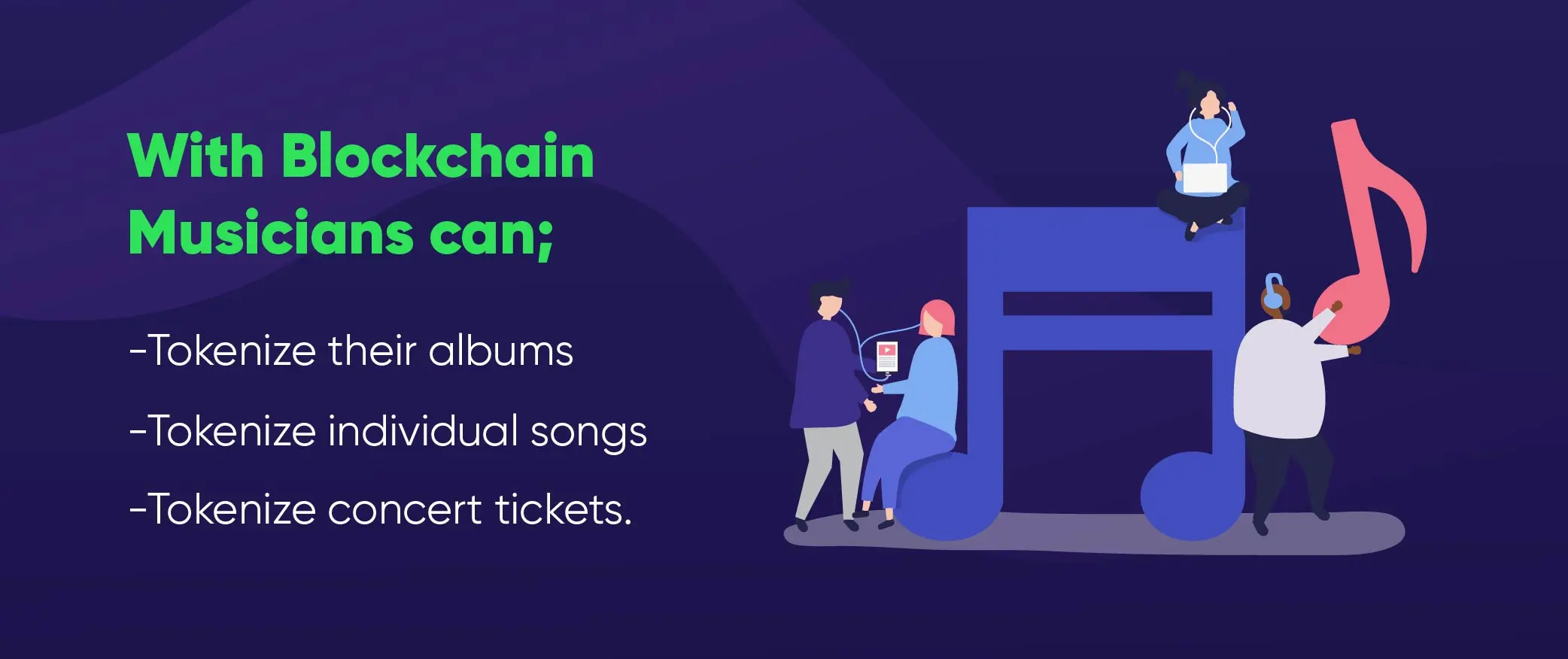
Introduction
Web3 & Blockchain Consultancy :
How Blockchain is Disrupting the Music Industry?
The symphony of technology and creativity is an innovation that has emerged as a powerful crescendo called blockchain. A technology once synonymous with cryptocurrencies like Bitcoin has now found its rhythm in the world of music. A talented musician pouring his heart into his work but he must be struggling to make ends meet in an industry filled with gatekeepers and uncertainty. Blockchain technology is here to change the game, offering a glimmer of hope for these artists. This harmonious fusion, where digital ledgers meet melodic chords, is reshaping the music industry as we know it. In this blog, you’ll discover a transformative story of innovation, decentralization, and harmony within blockchain in the music industry that has been waiting for its next revolution. Welcome to the symphony of blockchain and music, where the old notes are fading, and the new ones are playing a tune of change.Music Before Blockchain
- Centralized Control: The music industry was dominated by a few major record labels that had substantial control over the production, distribution, and promotion of music. These labels acted as gatekeepers, deciding which artists would be signed and which music would reach the masses.
- Complex Royalty System: Musicians relied on complex royalty systems to receive payment for their work. This often involved multiple intermediaries, making it difficult for artists to track and ensure fair compensation for their music.
- Piracy and Copyright Infringement: Piracy was a significant issue. Music could be easily pirated and shared without the artist’s consent, resulting in lost revenue for musicians and the industry. Copyright infringement was challenging to combat effectively.
- Limited Transparency: The lack of transparency in revenue distribution and royalty calculations left many artists uncertain about whether they were being fairly compensated. This opacity often led to disputes and legal battles.
- Dependency on Streaming Platforms: The rise of digital music and streaming platforms introduced new challenges. Musicians often received meager payouts from streaming services, despite their music being streamed millions of times.
- High Barriers to Entry: Independent and emerging artists faced barriers to entry, as they struggled to secure deals with major record labels and gain access to distribution networks.
- Limited Fan Engagement: Artists had limited direct engagement with their fans, relying on third-party platforms and promotional efforts by record labels.

Blockchain In Music
The music industry today is like a broken record, endlessly repeating its struggles. Piracy is rampant, and billions of dollars are siphoned away from artists and creators. The traditional music business model, with its labyrinthine web of middlemen, leaves musicians with just a fraction of their earnings. After the integration of blockchain technology into the music industry, several transformative changes have taken place. Here’s an overview of the music industry’s landscape post-blockchain:- Empowered Artists: Blockchain technology has given artists newfound control over their work. They can release music directly to their fanbase without the need for record labels, giving them more autonomy in their careers.
- Fair and Transparent Revenue Sharing: Smart contracts and blockchain ensure that earnings are distributed fairly and transparently. Artists receive their due share directly, without the need for complex royalty systems or intermediaries.
- Tokenization of Music: Musicians can tokenize their music, albums, or even concert tickets. These tokens can be sold directly to fans, creating a direct and personal connection. Fans can invest in their favorite artists, providing essential funding for their projects while receiving unique benefits in return.
- Decentralized Distribution: Blockchain eliminates the need for traditional distribution channels. Artists can distribute their music directly to listeners, reducing costs and increasing their share of the revenue.
- Protection Against Piracy: Blockchain’s immutable nature makes it difficult for piracy to thrive. Music rights can be securely recorded on a blockchain, making it easier to track and protect intellectual property. Artists have better control over their work and can receive fair compensation for its use.
- Direct Fan Engagement: Artists can engage directly with their fans through blockchain-based platforms. Fans can support their favorite musicians directly, creating a stronger and more personal connection.
- Diverse Funding Models: Artists have access to new funding models. They can use crowdfunding or issue tokens to fund their projects, allowing them to engage their fanbase in the creative process and receive financial support.
- Global Collaboration: Blockchain facilitates global collaboration between artists and creators. Smart contracts can automate revenue sharing among collaborators, making it easier to work with others worldwide.
- Licensing and Copyright: Blockchain simplifies the management of music rights and copyrights. Artists can record their rights on a blockchain, ensuring that they are fairly compensated when their music is used in various media productions.
- Data Analytics and Insights: Blockchain allows for the transparent tracking of music data. Artists and industry stakeholders can access real-time analytics, helping them make informed decisions about their music careers.
- Emerging Platforms: Several blockchain-based platforms, such as Choon, Mycelia, and Ujo Music, have emerged to provide artists with the tools and resources they need to navigate the music industry in this new era.
The Real Magic of Blockchain in Music is Smart Contracts
The concept of smart contracts is the secret sauce behind the music industry’s transformation. Smart contracts automate agreements, ensuring that every party involved, from the artist to the fan, gets what they deserve. The days of disputes and disputes over royalties are fading away as blockchain ensures a fair and efficient distribution of earnings.Blockchain Applications in the Music Game
Now, let’s introduce you to the mavericks who are leading the charge in reshaping the music industry:- Imogen Heap: This Grammy-winning artist has been a vocal advocate for blockchain technology. Her project, Mycelia, is a testament to the power of blockchain in empowering artists. Through Mycelia, she’s enabled musicians to share their music directly with fans, creating a more transparent and equitable ecosystem.
- Ujo Music: This Ethereum-based platform connects artists directly with their audience, using smart contracts to ensure that earnings are fairly distributed. Through Ujo Music, artists can publish their music and let the blockchain handle the rest.
- Viberate: Viberate, a decentralized music platform, is connecting musicians with event organizers and music venues. It uses blockchain to create a comprehensive database of musicians, simplifying the process of booking artists without intermediaries.
- JAAK: JAAK is a blockchain network that aims to streamline the music licensing process by creating a transparent and immutable database of music rights. This ensures that artists, producers, and other stakeholders receive the compensation they deserve when their music is used in various media productions.
Why Blockchain is important for artists?
Blockchain is the key to unlocking artists’ potential. It empowers musicians, regardless of their fame or fortune, to take control of their careers. Blockchain for music has opened doors for artists of all backgrounds, offering them the recognition and earnings they truly deserve.
Tokenizing the Tunes
Musicians are no longer confined to the traditional royalties model. They are now breaking down their work into digital units of value known as tokens. This isn’t just a financial strategy; it’s a profound revolution in how artists are rewarded for their creativity.
Blockchain for music has opened doors for artists of all backgrounds, offering them the recognition and earnings they truly deserve.
Tokenizing the Tunes
Musicians are no longer confined to the traditional royalties model. They are now breaking down their work into digital units of value known as tokens. This isn’t just a financial strategy; it’s a profound revolution in how artists are rewarded for their creativity.
 These tokens can be sold directly to fans, creating a direct and highly personal connection. Fans can invest in their favorite artists by purchasing these tokens, providing artists with essential funds for their projects while receiving unique benefits in return.
Its Impact
This direct interaction between artists and fans fosters a deeper connection, with both parties reaping the rewards. Artists receive the necessary funds to create and produce their art, while fans get exclusive perks and a sense of ownership in the artist’s success.
These tokens can be sold directly to fans, creating a direct and highly personal connection. Fans can invest in their favorite artists by purchasing these tokens, providing artists with essential funds for their projects while receiving unique benefits in return.
Its Impact
This direct interaction between artists and fans fosters a deeper connection, with both parties reaping the rewards. Artists receive the necessary funds to create and produce their art, while fans get exclusive perks and a sense of ownership in the artist’s success.
Real-life Example of Blockchain in Music
The below examples demonstrate the diverse applications of blockchain technology in the music industry, providing artists with greater control, transparency, and financial benefits while revolutionizing the way music is created, distributed, and consumed;- Mycelia for Music Makers: Mycelia for Music Makers, founded by musician and producer Imogen Heap, is a research and development hub exploring how blockchain technology can benefit music makers. It focuses on creating a fairer ecosystem for artists, ensuring they have control over their creative works and receive proper compensation.
- Vezt: Vezt is a blockchain-based platform that allows fans to purchase a share of their favorite songs. Through smart contracts, artists can tokenize their music and offer fans the opportunity to invest in their work. Investors then receive royalties whenever the song generates revenue, creating a direct connection between artists and fans.